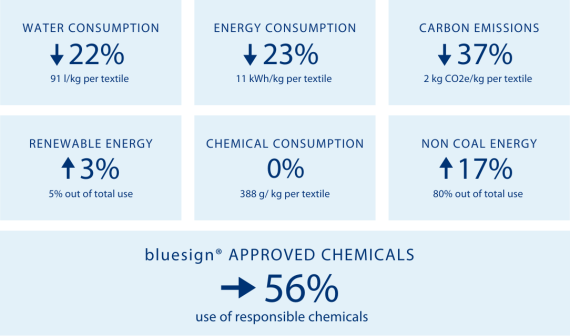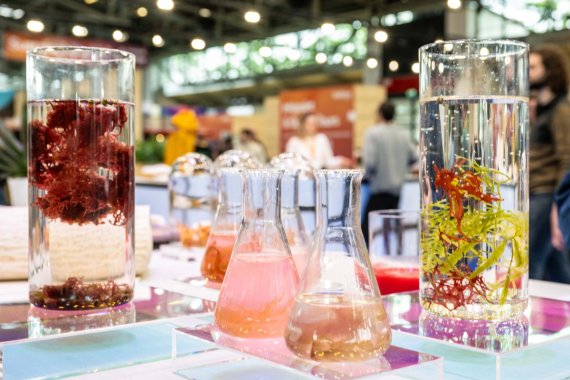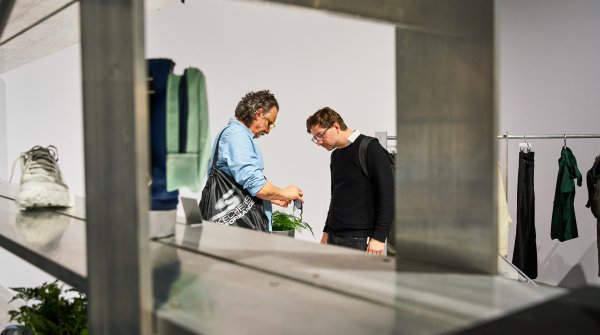The modern concept of sustainability was defined by the United Nations in 1987: Sustainable development is development that meets the needs of the present without compromising the ability of future generations to meet their own needs. However, the term "sustainable" originally goes back to forestry. Since the 18th century, it has been used to describe the practice of cutting only as much wood as can grow back in the same period of time.
What we know for sure today: Much more wood was felled than can grow back. The 1.5-degree target was exceeded for the first time in 2024 and resolutions, such as the recent one at the COP29 climate conference, appear insufficient to slow down global warming. Where politicians fail to take action, others must take responsibility, especially the textile industry, which is responsible for around ten percent of global emissions.
What we know for sure today: Much more wood has been felled than can grow back. The 1.5-degree target was exceeded for the first time in 2024 and resolutions, such as the recent one at the COP29 climate conference, appear insufficient to slow down global warming. Where politicians fail to take action, others must take responsibility, especially the textile industry, which is responsible for around ten percent of global emissions.
However, there are also companies that have been taking on this responsibility for years. First and foremost Patagonia: "Companies have a moral responsibility to protect the planet," says founder Yvon Chouinard. Since 2022, the company has been owned by the earth and therefore does not serve the interests of individual investors, but rather the planet and the fight against climate change. Patagonia hosted the Sustainability Hub at ISPO Munich to promote the exchange of knowledge.
Contrary to political developments around the world, countless studies show that consumers expect brands to do more to protect the environment. The younger generations have become more aware. They are willing to spend more money on truly sustainable brands and are actively looking for business models that improve the world.
Beth Thoren (Patagonia), Hunter Lovins (Natural Capitalism Solutions) and Laura Santucci (Future Economy Forum) are certain that the power of community in action is particularly effective in reaching this group. Lovins calls for a change of perspective:
In this context, Beth Thoren from Patagonia talked about the exemplary support of a small Croatian NGO that is committed to protecting wild rivers: Brand was involved for over eight years in the form of donations and letters to the government. "Our highest value is to protect nature," says Thoren. Patagonia repeatedly draws attention to grievances and supports the protest movement. In Croatia, employees and customers took part in campaigns: "Together, we were actually able to ensure that the rivers remain untouched to this day!"
Perseverance and a clear stance on environmental issues are part of Patagonia's recipe for success, explained Thoren. "Especially in America, people love the Brand for this fighting spirit." Environmental activist Hunter Lovins underlined this impression: "Nothing is more effective than the power of the community. It takes years to build a loyal community. You have to be one hundred percent honest, talk openly about challenges and always emphasize your values."
Transparency is not only the top priority of a sustainable economy in terms of customer loyalty. It is also literally becoming the law along the supply chain. A strict duty of care has been in force in the EU since last year and will be extended to the entire textile industry in the coming years. And Australia already has corresponding legislation in place.
But how do you get an overview? "We need to help suppliers overcome their fear of sharing all information," said Nick Allen, Transparency Director at Patagonia. Bettina Roth from VAUDE also confirmed that long-term, trustworthy relationships are the key to a sustainable circular economy. As Head of Quality Management & CSR Supply Chain, she is aware of the challenges of examining supply chains. "We want to share our knowledge with the industry and hope for technical solutions to collect, collate and evaluate data. Preferably standardized."
Because this is not so easy as a commercial enterprise - keyword: antitrust law - good partnerships are needed. Institutions such as bluesign technologies do not have their hands tied when it comes to combining data sets in order to gain and disclose new insights.
"Material processing has the greatest impact," says bluesign CCO Barbara Oswald, using her data sets. At bluesign, textiles are assessed in terms of energy consumption, raw materials, water consumption, chemicals, water pollution and waste. The label is intended to help the (sports) industry make better material decisions and ultimately change design processes, supply chains and recycling measures in a sustainable way.

Although recycling is generally seen as a great source of hope, only 15-20 percent of all textiles are currently recycled - and at the same time more is being produced than ever before. If things continue like this, the amount of plastic (waste) on the planet will triple in the next 50 years. There will then be more plastic floating in our oceans than fish.
In the above-mentioned Netflix documentary "Buy Now! The Shopping Conspiracy" (2024) mentioned above, the disaster becomes particularly clear. With the help of AI, the film visualizes the absurdity of global overproduction, especially in the textile industry, for which ex-Adidas President Eric Liedtke has his say: "We can no longer ignore the fact that a large proportion of clothing is made of plastic - plastic that ultimately ends up in our oceans and our food. We need to rethink the system from the ground up."
Even though Patagonia no longer uses plastic, material production still accounts for 90 percent of the brand's carbon footprint. Many good suggestions on how to change this were presented at the Material Hub at ISPO Munich - in the form of bio-based materials made from algae or mushrooms.
"We are still at the very beginning of the development of bio-based materials for the textile industry," says François Delaunoy from Gecko Components. But it is very likely that high-performance sportswear could also be made from algae, mushrooms or flax in the future. A trend researcher reported that biomaterials are already acceptable in the automotive industry and showed examples from BMW and Peugeot; flax can be as robust as carbon.
In contrast, the start-up Kuori from Zurich opened up completely different possibilities with its elastic biomaterial; it comes in the form of pellets and is suitable for shoe soles, tires or handles, for example - naturally BPA-free.

Jean Marc Dijan from The North Face once said in an ISPO guest article that nothing contributes more powerfully to a conscious, sustainable lifestyle than (sporting) nature experiences. Anyone who experiences how much nature gives you wants to preserve it, it's as simple as that.
Can sporting events do the same? UEFA sustainability officer Charles Frémont reported on the sustainability concept of the Olympic Games in Paris last year. The venues in the middle of the city had led to more people taking part and a significant increase in sports participation. Measures such as cleaning up the Seine, vegetarian food trucks and recycled packaging material also helped to raise visitors' awareness of a sustainable lifestyle. And the fact that the sports and outdoor industry per se makes a special contribution to environmental protection and sustainable economic development reinforces the positive effect.
Frémont sees the future of sporting events in smaller, urban events: "Transportation, i.e. the arrival and departure of athletes and spectators, is the most climate-damaging factor." The awarding of the 2034 FIFA World Cup to Saudi Arabia proves that there is still a long way to go. But neither FIFA, Donald Trump nor Elon Musk can dampen the motivation of a predominantly young, active generation of entrepreneurs who are happy to give their all to protect Croatian wild rivers. They will certainly be a little further ahead at the next Outdoor.
The discussion about sustainability shows that companies need to act in order to drive real change. The sports and textile industry is increasingly relying on innovative solutions to live sustainability credibly.
- Transparency is key: Clear supply chains and open communication are essential to create credibility and trust.
- Driving forward the circular economy: Recycling alone is not enough - long-lasting, sustainable materials and resource-saving production processes are needed.
- Sustainable business models are in demand: Consumers, especially the younger generation, prefer brands that take responsibility and offer real solutions.
- Collective responsibility: Companies, consumers and politicians must work together to drive change in the economy.
- Sustainability as a success factor: If you want to survive in the long term, you need to make sustainability an integral part of your corporate strategy.

 Sports BusinessSponsorship between fairness and image
Sports BusinessSponsorship between fairness and image
- Awards
- Mountain sports
- Bike
- Fitness
- Health
- ISPO Munich
- Running
- Brands
- Sustainability
- Olympia
- OutDoor
- Promotion
- Sports Business
- Textrends
- Triathlon
- Water sports
- Winter sports
- eSports
- SportsTech
- OutDoor by ISPO
- Heroes
- Transformation
- Sport Fashion
- Urban Culture
- Challenges of a CEO
- Trade fairs
- Sports
- Find the Balance
- Product reviews
- Newsletter Exclusive Area
- Magazine






